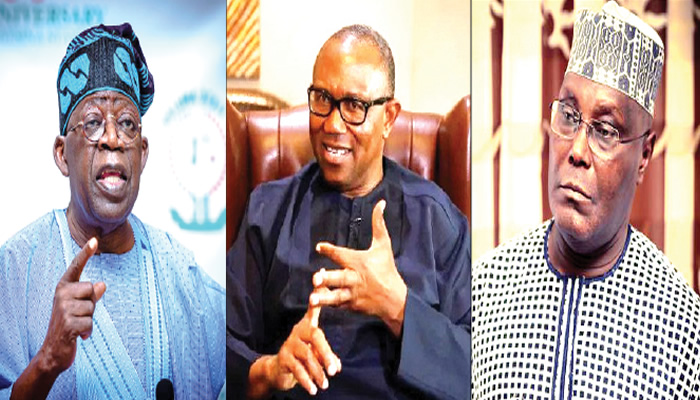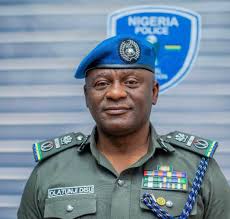As Nigerians go to the polls on Saturday to elect the President, Major General Muhammadu Buhari’s (retd.) successor, GIFT HABIB writes on electoral processes from polling units to declaration of results.
There is a lot of anticipation as over 93 million registered voters prepare to cast their ballots on Saturday to decide who takes over from the President, Major General Muhammadu Buhari (retd.) on May 29, 2023.
According to the Independent National Electoral Commission, the 2023 general elections consist of a presidential election, governorship elections in 28 states, and 1,462 legislative elections representing 109 Senate seats, 360 House of Representatives seats, and 993 State House of Assembly seats.
Different stakeholders have described the 2023 presidential election as a “tough race” in the history of the country, as four out of 18 presidential candidates are jostling hard for the seat of the presidency. The moment represents the seventh election cycle since Nigeria became a democracy in 1999.
The four major candidates, Bola Tinubu of the All Progressives Congress, Atiku Abubakar of the Peoples Democratic Party, Peter Obi of the Labour Party, and Rabi’u Kwankwaso of the New Nigeria Peoples Party, have all toured different states in Nigeria and given reasons, why Nigerians should trust them with their votes, come Saturday.
The winner of the presidential race will serve as a critical transfer of power, as President Buhari has served two terms and is not qualified to rule for another four years.
However, the success of any election depends on efficient planning and its conduct, that is, accreditation, voting, counting, collation, and result declaration.
Before a person can vote, he must be a Nigerian of 18 years of age or older, registered, and in possession of a permanent voter card, and must appear in person at the polling unit. The voter will vote in the polling unit where his or her name is listed.
The election will run from 8.30am to 2.30pm. However, voters in the queues on or before 2.30pm will be allowed to vote.
Registered voters are to be at their polling units before 8am in a coordinated manner. Voting starts at 8.30am.
The presiding officers or assistant presiding Officers I, II, or III will ask the voters to present their permanent voter cards for accreditation using the Bimodal Voter Authentication System.
The voter is expected to check and be sure his or her name is on the register of voters in that particular unit. If the voter’s name is in the register, the BVAS will match his fingerprints and (or) face, one of which must successfully identify the voter as the owner of the PVC presented to the official before he will be allowed to vote.
If the BVAS fails to recognise the voter’s fingerprint, the facial recognition function of the BVAS will be used to verify and accredit the voter. If the above steps are completed, a poll official will check for the voter’s name in the register of voters and tick it.
Indelible ink will be applied to the cuticle of the voter’s finger. A stamped, signed, and dated ballot paper will be issued to the voter afterwards.
However, if the BVAS fails to recognise a voter’s fingerprints as well as his facial photograph, the voter will not be allowed to vote.
The voter will go to the voting cubicle to mark his or her choice on the ballot paper in secret. The voter will ensure that the ink does not smear onto other parts of the ballot paper to avoid having his or her vote rejected.
The ballot paper should be folded vertically, and he or she will not be allowed to take photographs of the ballot paper when in the voting cubicle. The voter will drop the marked ballot paper into the ballot box in full view of all present.
After casting his or her vote, the voter is free to remain 300 metres from the polling area to witness sorting, counting, and the announcement of the results provided the voter is orderly and does not disrupt the process.
Results shall be collated at the polling unit and various other levels depending on the type, after which they are announced by INEC.
From the polling units, the result will be transmitted electronically to the INEC website. The presiding officer will take the result to the ward headquarters, where they the results of all polling units will be collated and sent to the local government headquarters. From the local government level, it will be sent to the state capital and INEC headquarters in Abuja.
Explaining how a president emerges and the conditions that may necessitate a second election, the National Commissioner and Chairman, Information and Voter Education, INEC, Festus Okoye, explained, “Section 134 (2) of the Constitution of the Federal Republic of Nigeria, which is the fundamental law of the land, makes it mandatory that before anyone can be deemed to have been elected as president of the Federal Republic of Nigeria, that candidate must secure the highest number of votes cast at the election and must also secure a quarter of the votes cast in two-thirds of the states and the Federal Capital Territory. It is mandatory.
“Now, if no candidate secures this highest number of votes and the mandatory threshold, the constitution says we must have a second election within 21 days. Not all candidates are going to participate in this second election. Eighteen candidates will be on the ballot for the first election. If no candidate emerges from the first ballot, only two candidates will contest the second election.
“The constitution has made it very clear that of the two candidates that will be on the ballot, one must score the highest number of votes in the election. The second candidate that will be on the ballot is one of the remaining candidates who have a majority of votes in the highest number of states. The constitution did not say that the one who came in second would be in the second election.”
For the presidential poll, the INEC Chairman, Mahmood Yakubu, who is the chief electoral officer, is expected to announce the result in Abuja.
The commission says it is prepared for the second election if the situation arises, taking into consideration the fact that it will be difficult to engage in reverse logistics and then begin to look for printers to print 93 million ballot papers before the commission starts thinking of how to move them to the states, local governments, wards, and polling units.
The commission has printed the ballot papers for the main election and the run-off election at the same time. That is what the commission will do.
The Executive Director of Civil Society Legislative Advocacy, Auwal Musa, noted that the entire process of a president emerging on February 25 has been a herculean task, noting that each process was marred by one challenge or another that could affect the election results.
Musa said, “From the party primaries that took place last year, we saw the determination of aspirants from the 18 political parties working day and night to emerge as presidential candidates of their party. Although this was not done without controversies, hate speech, or bribing of delegates.
“The political campaigns were full of attacks, especially on party supporters. Hate speech and violence became the order of the day. Most presidential candidates dodged the compulsory national debates, and those who attended did not deliver manifestos that will bring critical development to the country and provide a good life for Nigerians.
“Approaching the election period in which Nigerians will decide a new Nigeria with their vote, the naira crisis and fuel scarcity might end up shaping the votes of Nigerians as poor and average Nigerians are affected by the menace. Vote-buying will play out as a result.
“We only pray for the best as Nigerians cast their votes, and whoever emerges as the winner of the presidential election, it should be taken in good faith.”
Also, the Director of the Centre for Democracy and Development, Idayat Hassan, said, “The entire process has been interesting. One of the keen interesting things is what the Electoral Act of 2022 did. It changed the whole context. It threw political parties into disarray during their primaries, since most of them were not even aware of some of the provisions of this Electoral Act.
“It was able to balance and reduce incumbency in politics because this time around, people could resign before they could run for any position. We saw a lot of them resign, which rarely happens in the pre-election process. The primaries were quite interesting because it was a two-way thing. Looking at the primaries, the aspirants had to go across the country to canvass for votes from their party members, which was new. However, money was used to devalue this good innovation. People bought votes to emerge as winners of party primaries.
“The campaign period too is worrying. The level of campaign violence is high. For us at CDD, we have been able to count a total of 60 attacks on campaign rallies as opposed to 24 during the 2019 general election.
“There were lots of challenges, but I think the most important thing is the mere fact that it happened, and now, we are closer to the election. Nigerians are eager to see what happens on Saturday.” CONTINUE READING…………………………….
THIS IS FOR YOU🤳🏾👨🏼💻
For your Surprise birthday wishes, Business Advert Placement, Publicity Online and offline, Press Release, Social Media Management, For Your Content Writer Plug, Personality Promotion, Special Report, Featured Story, Conference, And Interviews – CONTACT US @VAM on WhatsApp/Call📞@ 08072633727 📲




